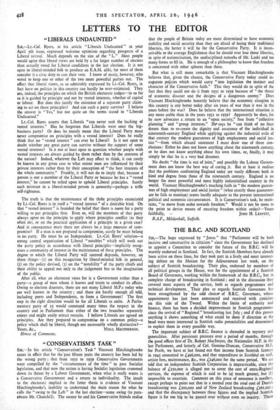LETTERS TO THE EDITOR
" LIBERALS UNDAUNTED "
Sm,—Lt.-Col. Byers, in his article "Liberals Undaunted " m your April 5th issue, expressed welcome optimism regarding prospects of a Liberal revival. Much depends on the size of the "L." Most people would agree that liberal views are held by a far larger number of electors than actually voted for Liberal candidates in the last election. It is not open to liberal-minded folk to produce an E.A.M. alibi, for most of them consider it a civic duty to cast their vote. I know of many, however, who voted to keep one or other of the two more powerful parties out. The effect that liberal views, as so admirably expressed by Lt.-Col. Byers, in fact have on politics in this country can hardly be over-estimated. They are, indeed, the principles on which the British electorate judges—in so far as it is guided by principle and not by vested interests, whether of capital or labour. But does this justify the existence of a separate party claim- ing to act on those principles? And can such a party survive? I believe the answer is " Yes," but not quite on the terms stated in " Liberals Undaunted."
Lt.-Col. Byers asserts that Liberals "can never seek the backing of vested interests." Has he forgotten that Liberals were once the big- business party? Or does he merely mean that the Liberal Party must never compromise on principles with a vested interest? Does he really think that no " vested interest " can ever be Liberal? Is it not open to doubt whether any great party can survive without the support of some vested interests? Is it not at least open to question whether people with vested interests are always guided by them rather than by the interests of the nation? Indeed, whatever the Left may affect to think, it can rarely be known in any given case to what extent men are influenced by their private interests rather than by their conception of " the best interests of the whole community." Frankly, it will not do to imply that, because a person is not a member of the Liberal Party or because he has a " vested interest," he cannot be relied upon to uphold Liberal principles. Surely such mistrust in a liberal-minded person is unworthy—perhaps a trifle self-righteous.
The truth is that the maintenance of the thiie principles enunciated by Lt.-Col. Byers is in itself a " vested interest " of a desirable. kind. On that " vested interest " is founded the belief that there is room for a party willing to put principles first. Even so, will the members of that party always agree on the principle to apply where principles conflict (as they often do), or on the practical application of a principle in a given case? And in consequence must there not always be a large measure of com- promise? If a man is not prepared to compromise, surely he must belong to no party. He must be an Independent. Lt.-Col. Byers' solution—a strong central organisation of Liberal "notables" which will work out the party policy in accordance with liberal principles—implicitly recog- nises a community of interest in the maintenance of these principles. The degree to which the Liberal Party will succeed depends, however, on three things—(5) on this recognition by liberal-minded folk in general, (2) on the policy devised, (3) on the "notability" of the party chiefs and their ability to appeal not only to the judgement but to the imagination of the public.
After all, what an electorate votes for is a Government rather than a party—a group of men whom it knows and trusts to conduct its affairs. Owing to election disasters, there are not many Liberal M.P.s today who are well known in the country ; and there are hardly enough all told, including peers and Independents, to form a Government! The first step in the right direction would be for all Liberals to unite. A Parlia- mentary party of 25 would command many times the respect in the country and in Parliament than either of the two branches separately enjoys and might easily attract recruits. I believe Liberals are agreed on principles. Are they prepared to compromise on a common policy—a policy which shall be liberal, though not necessarily wholly distinctive?—


























 Previous page
Previous page